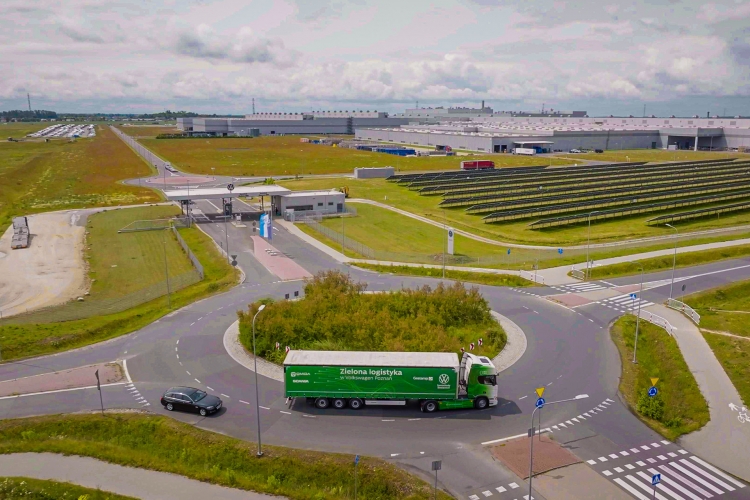Volkswagen Poznań Takes Another Step Toward Zero-Emission Transport
- Oprac. M.K.
- Kategoria: English zone
Another electric truck is now delivering components to Volkswagen’s factory - this time, body parts for the Września plant.
The newly deployed Scania R 400E electric truck travels six times a day from Gestamp - an international company specializing in the design, development, and production of highly advanced automotive components — to the Crafter plant in Września. Over the course of a year, it will cover approximately 20,000 kilometers. A single full charge is sufficient for about 400 kilometers.
How much CO₂ can be reduced?
When comparing the estimated annual electricity consumption of this route with the thousands of liters of diesel a conventional truck would require, the reduction in carbon footprint is estimated to exceed 20 tons of CO₂ per year. This is equivalent to the amount of CO₂ absorbed annually by a forest of around 4 hectares. Importantly, from a production standpoint, the Scania truck requires no additional breaks for charging - the vehicle is charged exclusively during unloading.
Cutting Emissions and Noise
The fully electric truck used for deliveries between Volkswagen Września and Gestamp is a project that fills me with optimism. It represents a major step toward implementing sustainable transport practices at the local level. This initiative will have a real impact on reducing harmful emissions. Projects like this are setting new standards in the automotive industry. Pro-environmental actions are vital, as they bring measurable long-term results - including for future generations - says Artur Mokracki, Mayor of Września.
This sentiment is echoed by Wojciech Olasek, who notes that another electric truck is currently being deployed for deliveries between Września and Swarzędz.
Integrating more electric vehicles into our daily operations proves that electromobility in logistics is working. Tests have confirmed that with proper planning and cooperation with our partners, electric-powered transport is not only possible but also efficient - both operationally and environmentally - he adds.
Olasek also emphasizes that Volkswagen Poznań is not limiting its green logistics efforts to short distances. For example, in winter, an electric truck was tested on a longer route between Volkswagen’s plant in Poznań and Volkswagen Motor Polska in Polkowice. Each day, the truck covered about 300 kilometers - and despite temperatures dropping as low as -14°C, the test was a success.
Green Logistics Is the Future
Transport between production facilities is one of the key elements of the automotive supply chain. Until recently, this was largely dependent on diesel-powered trucks.
Now, thanks to Volkswagen Poznań and its partners, that is beginning to change. Since 2023, the manufacturer of models such as the Caddy and Crafter has been using another electric Scania to deliver components daily between the supplier park in Swarzędz and the Poznań production plant. Over the past two years, that vehicle has transported nearly 200,000 rear axles for the Caddy model.
The environmental impact? It’s estimated that this use reduces CO₂ emissions by about 50 tons annually - in addition to significantly lowering noise levels, which is particularly important for nearby residents.
I’m glad we can support Volkswagen Poznań on its journey toward zero-emission operations. Introducing this new vehicle into service is another strong testament to our partnership and the readiness of our organizations to embrace electromobility. The tractor unit now driving through Greater Poland features an electric powertrain with a 624 kWh battery capacity and a maximum charging power of 375 kW. This configuration offers wide applicability across Volkswagen Poznań’s logistics network while ensuring high efficiency through minimized charging times. More journeys lie ahead - says Paweł Kurzawa, Director of Electromobility at Scania Polska S.A.
At Gestamp, we are committed to building a more sustainable future in close collaboration with our customers and partners. Initiatives like this - combining innovation, sustainability, and efficient logistics - demonstrate how the automotive industry can reduce emissions while maintaining operational excellence - adds Alfredo Rivas, Director of the Września Plant at Gestamp Polska.
Szymon Rusztyn, President of Omida VLS, shares a similar perspective:
Investing in a new vehicle is another step in the strategy that Omida VLS is developing with our partners, steadily building a strong, unified brand. This initiative strengthens our operational capacity and contributes to the continued development of the road transport sector in Poland. We want to show that the logistics of the future is happening now - and it is having a real impact on reducing the carbon footprint.
Source: Volkswagen Group Polska



